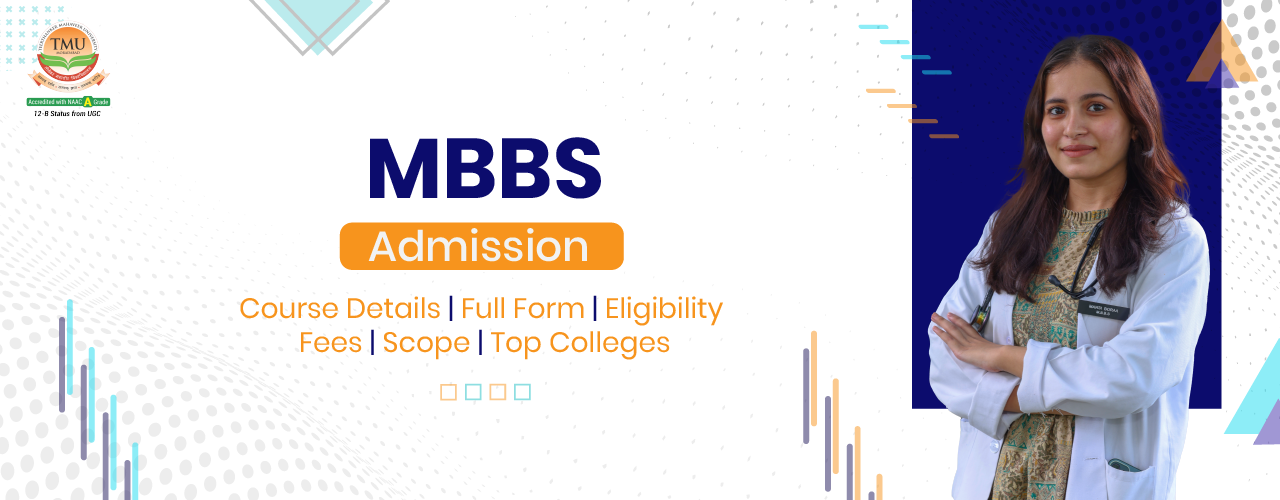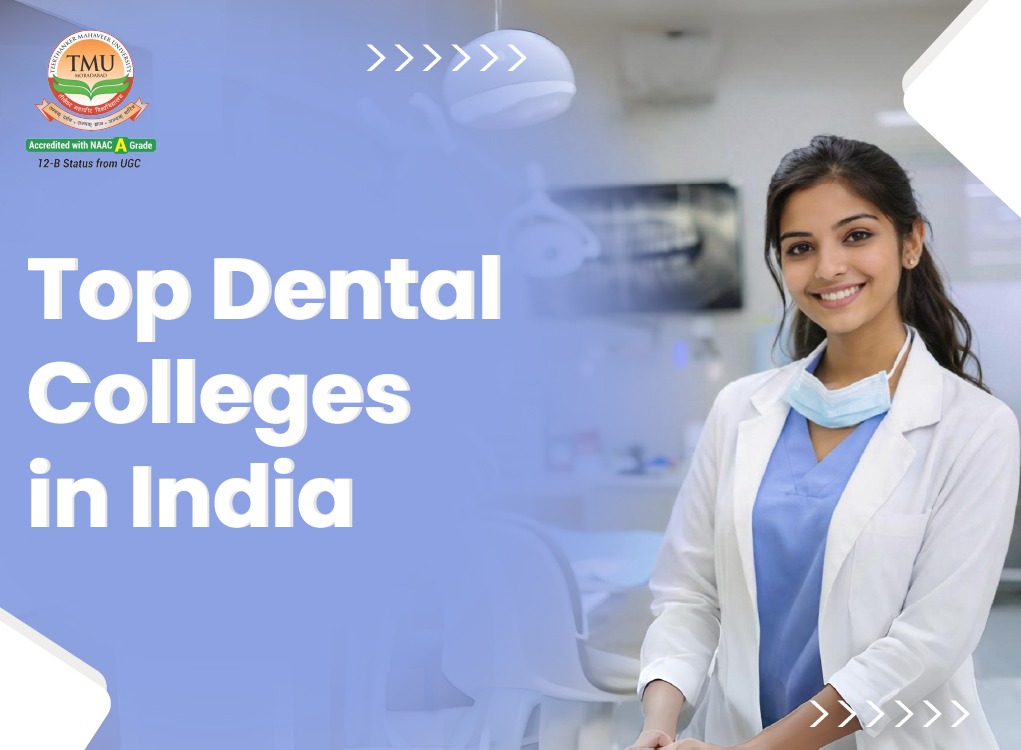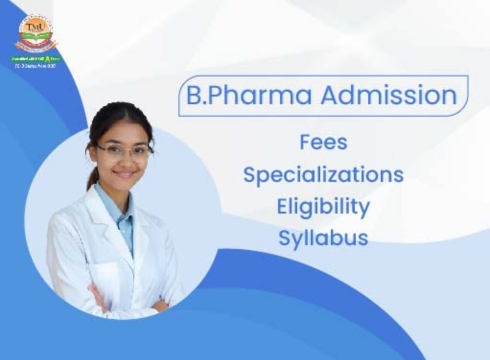MBBS Course Details, Full Form, Fees, Eligibility, Duration, Syllabus, Admission, College and Career
Table of Contents
MBBS stands for Bachelor of Medicine, Bachelor of Surgery, and is the foundational undergraduate degree required to become a medical doctor in India. The course typically spans 5.5 years, which includes 4.5 years of academic study and 1 year of mandatory internship in hospitals or health centres. To be eligible for MBBS, candidates must have completed 10+2 with Physics, Chemistry, and Biology as core subjects, securing at least 50% marks (40% for reserved categories). Admission to MBBS programmes across India is primarily through the NEET (National Eligibility cum Entrance Test), which is a national-level entrance examination conducted by the NTA.
MBBS Full Form
The MBBS full form is Bachelor of Medicine and Bachelor of Surgery. Historically these were separate degrees but they are now typically awarded together. The less common long form reflecting the historical separation is Medicinae Baccalaureus Baccalaureus Chirurgiae. Both terms signify the same qualification.
Teerthanker Mahaveer University
Apply for Admission
Click Here To Apply for Admission
MBBS Course Details
The MBBS (Bachelor of Medicine and Bachelor of Surgery) is a professional undergraduate medical degree that prepares students for a career in clinical medicine. It is one of the most sought-after courses in the healthcare sector and forms the basic qualification required to become a licensed medical practitioner in India. The MBBS curriculum combines theoretical knowledge with practical clinical training, enabling students to diagnose and treat human diseases effectively
MBBS Course Overview Table
| Parameter | Details |
| Course Name | MBBS (Bachelor of Medicine and Bachelor of Surgery) |
| Course Duration | 5.5 Years (4.5 years academic + 1 year compulsory internship) |
| Level | Undergraduate |
| Eligibility Criteria | 10+2 with Physics, Chemistry, Biology; Minimum 50% marks (40% for SC/ST/OBC) |
| Minimum Age | 17 years at the time of admission |
| Entrance Exam | NEET-UG (National Eligibility cum Entrance Test) |
| Admission Process | Based on NEET rank, followed by counselling |
| Course Structure | Pre-clinical, Para-clinical, Clinical subjects + internship |
| Regulatory Body | National Medical Commission (NMC), India |
| Career Options | General Physician, Surgeon, Medical Officer, Postgraduate Studies (MD/MS) |
| Average Course Fee | ₹5 – ₹25 lakhs (varies by government/private/deemed institutions) |
MBBS Course Duration
The MBBS course duration in India typically consists of two parts:
- Academic Study:This is the core classroom and theoretical learning period. It usually lasts for 5 years. During this time students will delve into various medical science subjects gaining a strong foundation for clinical practice.
- Compulsory Internship:After completing the academic coursework all MBBS graduates must undergo a mandatory internship period. This typically lasts for 1 year. The internship provides hands-on experience in hospitals and clinics allowing students to apply their knowledge to real patients under the supervision of qualified doctors.
Academic Study:4.5 years (typical)
Internship:1 year (mandatory)
Total Duration:5.5 years (approximate)
MBBS Eligibility Criteria
To pursue an MBBS degree in India, candidates must meet the following eligibility criteria as prescribed by the National Medical Commission (NMC) and respective regulatory authorities:
Academic Qualifications
- Must have completed 10+2 (or equivalent) from a recognised board.
- Must have studied Physics, Chemistry, Biology/Biotechnology, and English as core subjects.
- Should secure a minimum of 50% marks in PCB (for the general category).
- For SC/ST/OBC candidates, the minimum required marks in PCB are 40%.
- PwD candidates must secure at least 45% in PCB subjects.
Age Limit
- The candidate must be at least 17 years old as of 31st December of the admission year.
- There is no upper age limit for NEET as per the latest NMC guidelines (subject to change).
Entrance Examination
- Qualifying NEET-UG is mandatory for admission to any MBBS course in India (including government, private, and deemed universities).
- Admission is granted based on NEET rank and counselling process conducted by MCC or state authorities.
Nationality
- Indian nationals, NRI/OCI/PIO and foreign nationals are eligible to apply, subject to the rules of respective universities and the Medical Council of India.
MBBS Entrance Exam
The National Eligibility cum Entrance Test (NEET-UG) is the sole entrance examination for admission to MBBS programmes in India. Conducted by the National Testing Agency (NTA), NEET is mandatory for entry into government, private, deemed, and even AIIMS and JIPMER medical colleges.
Key Highlights of NEET-UG for MBBS Admission
| Parameter | Details |
| Exam Name | NEET-UG (National Eligibility cum Entrance Test - Undergraduate) |
| Conducting Body | National Testing Agency (NTA) |
| Frequency | Once a year |
| Mode of Exam | Offline (Pen and Paper Based) |
| Subjects Covered | Physics, Chemistry, Biology (Botany + Zoology) |
| Total Marks | 720 |
| Number of Questions | 200 (180 to be attempted) |
| Exam Duration | 3 hours 20 minutes |
| Eligibility | 10+2 with PCB, minimum 50% (General), 40% (Reserved) |
| Minimum Age | 17 years as of 31st December of admission year |
| NEET Score Validity | 1 year (India), up to 3 years for some foreign universities |
Why NEET is Important for MBBS?
NEET is the gateway to MBBS dreams in India. This single national exam levels the playing field for students and selects the most prepared based on their knowledge. It brings transparency and standardisation to medical admissions. Additionally NEET is also recognised for MBBS admissions in some international institutions making it an important step for Indian students aiming to study medicine abroad.
MBBS Syllabus
The MBBS syllabus in India is structured as per the Competency-Based Medical Education (CBME) model prescribed by the National Medical Commission (NMC). It is divided into three phases — Pre-Clinical, Para-Clinical, and Clinical — spread over 4.5 years, followed by 1 year of compulsory internship.
MBBS Year-Wise Syllabus Table
| Phase / Year | Subjects Covered |
| First Year (Pre-Clinical) |
|
| Second Year (Para-Clinical) |
|
| Third Year – Part I (Clinical) |
|
| Final Year – Part II (Clinical) |
|
| Internship (1 Year) | - Rotational postings in all major departments, including Medicine, Surgery, OBG, Paediatrics, and Community Health |
MBBS Admission Process
Securing admission to an MBBS program in India involves several key steps. Here's a breakdown of the typical MBBS admission process:
- Eligibility Check:Ensure you meet the minimum education (10+2 with science) and age requirements.
- NEET Exam:Ace the National Eligibility cum Entrance Test (NEET), a single national entrance exam.
- Counselling & Seat Allotment:Based on your NEET score, participate in counselling to get a seat in a medical college.
- College Admission:Once allotted a seat, complete the admission formalities at the designated college.
Remember: Starting NEET preparation early and performing well is crucial for securing a seat in a competitive program. Check official college websites and relevant authorities (NTA) for the latest information.
Best MBBS Colleges in UP
Uttar Pradesh is home to some of India’s top government and private medical institutions offering MBBS, BDS, MD/MS, and other allied health science programmes. These colleges are recognised by the National Medical Commission (NMC) and provide quality medical education, infrastructure, clinical exposure, and research opportunities.
Below is a curated list of the best medical colleges in Uttar Pradesh for MBBS aspirants in 2025:
Top Medical Colleges in UP – Government & Private
| College Name | Location | Type | Highlights |
| Teerthanker Mahaveer Medical College & Research Centre (TMU) | Moradabad | Private (Deemed) | NMC-recognised; advanced hospital, modern labs, and research facilities |
| King George’s Medical University (KGMU) | Lucknow | Government | Premier govt. medical college; high NEET cut-offs |
| Sanjay Gandhi Postgraduate Institute of Medical Sciences | Lucknow | Government | AIIMS-level institute for PG and super-speciality training |
| Banaras Hindu University – Institute of Medical Sciences (IMS-BHU) | Varanasi | Government | One of India’s oldest and most reputed medical colleges |
| Motilal Nehru Medical College | Prayagraj | Government | High patient footfall and clinical exposure |
| Lala Lajpat Rai Memorial Medical College (LLRMMC) | Meerut | Government | Well-established and affiliated with CCS University |
Why Choose TMMCRC (TMU) for your MBBS Degree?
Teerthanker Mahaveer Medical College & Research Centre (TMMCRC), a constituent unit of Teerthanker Mahaveer University (TMU), Moradabad, stands out as a premier institution for pursuing an MBBS degree in Uttar Pradesh. It is recognised by the National Medical Commission (NMC) and follows the Competency-Based Medical Education (CBME) curriculum in line with national standards.
Key Reasons to Choose TMMCRC for MBBS:
- NMC & UGC Recognised: Offers a recognised MBBS degree approved by national regulatory bodies.
- 800+ Bed NABH-Accredited Hospital: On-campus multi-speciality hospital ensures rich clinical exposure and hands-on training.
- State-of-the-Art Infrastructure: Advanced laboratories, simulation centres, dissection halls, and digital classrooms.
- Experienced Faculty: A team of qualified doctors, researchers, and academic experts guides students throughout their medical journey.
- Modern Diagnostic Facilities: CT, MRI, radiology, pathology, and biochemistry labs aligned with industry standards.
- Interdisciplinary Exposure: Collaborations across TMU’s dental, nursing, paramedical, and allied health sciences faculties.
- Career Support & PG Preparation: Dedicated support for internships, PG entrance prep, and career guidance.
- Focus on Research & Innovation: Student involvement in national health programmes and medical research is encouraged.
- Safe & Student-Friendly Campus: Residential hostels, 24/7 security, sports facilities, and a medical library with e-resources.
Here are some resources that might be helpful:
- TMU Official Website: TMU website (Look for information on the MBBS program, faculty, and facilities)
- Rankings Websites:Websites like IIRFRankings, and careers360 can provide insights into the relative standing of medical colleges in India.
- Educational Consultancies:Consultants specialising in medical education can offer guidance based on your individual profile.
Additional Points:
- Hostel Fees:These are separate from tuition fees and can vary depending on the college and the type of accommodation.
- Hidden Costs:Factor in additional expenses like books, stationery, uniforms, and examination fees.
- Financial Aid:Some government colleges and private institutions offer scholarships and financial aid programs to deserving students.
Resources for Further Information:
- Official College Websites:Check the websites of specific colleges you're interested in for their fee structure.
- Government Websites:Websites of relevant medical education authorities might have information on fee regulations for government colleges.
Remember:
MBBS fees can be a significant financial commitment. Thoroughly research the fee structure of different colleges before making a decision. Explore scholarship and financial aid options to ease the burden.
MBBS in Abroad for Indian Students
MBBS abroad is an option for Indian students facing high competition for limited seats in India. It can be cost-effective in some countries and offers global exposure.
Why MBBS Abroad?
- Limited Seats in India:The number of MBBS seats in government colleges in India is limited, leading to high competition. Studying abroad offers more opportunities.
- Cost-Effectiveness:Compared to some private colleges in India, MBBS programs in certain countries can be more affordable.
- Global Exposure:Studying abroad provides international exposure to different healthcare systems and teaching methodologies.
Popular Destinations:
- Eastern Europe (Russia, Ukraine, Georgia):Affordable, English-medium options available.
- Southeast Asia (Philippines):American-influenced medical education system.
- China:Cost-effective, but language proficiency might be required.
Things to Consider:
- Accreditation:Ensure the university is recognized by a credible body.
- Cost of Living:Accommodation, food, etc.
- Language Barrier:English-medium programs preferred.
- Licensing Exams:You'll need to pass exams in India to practice.
Resources:
- Educational consultancies
- University websites
Remember:
Research thoroughly before deciding. Consider accreditation, cost, language, and your future career plans in India.
MBBS Abroad Fees:
MBBS fees abroad for Indian students can vary significantly depending on the country and the university. Here's a quick summary: Range: Generally starts from ₹3 lakhs per year (Eastern Europe) Can reach up to ₹50 lakhs per year (Western countries)
Breakdown:
- Eastern Europe (Russia, Ukraine, etc.):The most affordable option, fees start around ₹3-5 lakhs per year.
- Southeast Asia (Philippines):Mid-range option, fees typically fall between ₹10-20 lakhs per year.
- Western Countries (US, UK, etc.):The most expensive option, fees can reach ₹40-50 lakhs or more per year.
Additional Costs:
- Factor in living expenses, food, and transportation on top of tuition fees.
- Some universities might have additional charges for application fees, examinations, or hostel accommodation.
MBBS Salary
The salary of an MBBS doctor in India varies depending on several factors:
- Experience:Starting salaries are lower and increase with experience.
- Sector:Government doctors typically earn less than private doctors.
- Location:Salaries can be higher in metropolitan cities compared to rural areas.
- Specialisation:Specialists generally earn more than non-specialists.
Here's a general idea of the MBBS salary range in India:
| Experience Level | Salary Range (₹ lakhs) | Salary Range (₹ per month) |
|---|---|---|
| Freshers (0-4 years) | 4 - 7.5 | ₹33,333 - ₹90,000 |
| Mid-career (5-10 years) | 7.8 - 15 | ₹90,000 - ₹2,25,000 |
| Senior Doctors (10+ years) | 12.5 - 18.4 | ₹2,25,000 - ₹5,00,000 |
Important Points:
- These are approximate figures, and actual salaries can differ.
- Some doctors, particularly specialists in high demand, can earn significantly more.
- Doctors might receive additional benefits like health insurance, provident funds, and allowances, depending on their employment type.
Additional Resources:
- Salary surveys by job portals or medical associations can provide more specific data on MBBS salaries in India.
Remember:
MBBS Internships
MBBS internships in India are mandatory 1-year programs for medical graduates. They gain practical experience under supervision in various departments like medicine, surgery, and paediatrics.
Why it's important:
- Develops clinical skills and prepares graduates for practice
- Foundation for a successful medical career
Eligibility:MBBS degree and registration (check latest requirements)
Stipend:₹25,000 - ₹60,000 per month (varies by state and hospital)
MBBS vs BDS vs BAMS
| Feature | MBBS | BDS | BAMS |
|---|---|---|---|
| Field | Modern Medicine | Dentistry | Ayurveda |
| Course Duration | 5.5 years + 1 year internship | 5 years + 1 year internship | 5.5 years (including internship) |
| Entrance Exam | NEET | NEET | NEET (varies by college) |
| Career Options | Doctor (specialisations) | Dentist (specialisations) | Ayurvedic Doctor, Therapist |
Additional factors to consider:
- Interests: Are you drawn to general health, oral health, or a more holistic approach?
- Job opportunities: Consider the demand for each profession in your desired location.
- Future goals: Do you see yourself specialising in a specific area?
Conclusion
MBBS is a demanding yet rewarding career path that equips you with the knowledge and skills to become a qualified doctor. With careful planning and dedication, you can navigate the eligibility requirements, entrance exams, and competitive admissions process. The MBBS programme offers a comprehensive curriculum that balances theoretical knowledge with practical training, preparing you for a successful medical career.
Deciding where to pursue your MBBS degree depends on your individual goals and priorities. Consider factors like cost, accreditation, language of instruction, and future career aspirations. Both studying in India and abroad offer unique advantages.
No matter where you earn your MBBS degree, the journey to becoming a doctor requires hard work, perseverance, and a deep commitment to patient care. This guide provides a solid foundation of information about the MBBS programme in India and abroad. Use these resources to research further and make informed decisions about your medical education journey.
FAQ
Q1: How many marks are required in NEET for MBBS?
A: NEET qualifying marks for MBBS depend on category. General candidates need at least 720-164 (out of 720), while reserved categories require 163-129. These are percentile scores, not raw marks, and can vary each year.
Q2: Can I do MBBS without NEET?
A: NEET is mandatory for MBBS in India for most colleges. Except for a few private colleges with their own exams, NEET is the key. Consider retaking NEET, studying MBBS abroad (research well!), or exploring other medical fields like BAMS or BDS if NEET isn't your strong point.
Q3: What does MBBS mean?
A: MBBS stands for Bachelor of Medicine and Bachelor of Surgery. It's a professional undergraduate degree program that qualifies you to become a licensed medical practitioner.
Q4: What is the salary of MBBS in India?
A: MBBS qualifies you as a doctor with a starting salary of ₹1-2 lakh monthly. It increases with experience, location, and work sector (govt vs private). MD is a specialization for deeper expertise in a chosen medical field.
Q5: How many years for MBBS after 12th?
A: MBBS is typically a 4.5-year program after 12th grade in India. In some cases, it can extend to 5.5 years.















